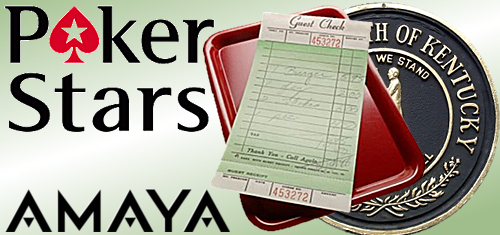 Canadian online gambling operator Amaya Gaming will ask PokerStars’ former owners to pay any damages imposed by a Kentucky court in an illegal gambling civil suit.
Canadian online gambling operator Amaya Gaming will ask PokerStars’ former owners to pay any damages imposed by a Kentucky court in an illegal gambling civil suit.
On Thursday, Amaya released a statement to provide “clarity” on Wednesday’s news that a Kentucky court had ordered Amaya to pay $290m to atone for PokerStars’ activities in the state before the 2011 Black Friday indictments forced the site to exit the US market.
Amaya called the state’s civil lawsuit “frivolous and without merit” and rubbished the century old statute on which it was based. That statute allows third parties to collect on other state residents’ illegal gambling losses and to force the illegal gambling operator to pay three times the value of these losses.
In a Nov. 20 ruling, Franklin Circuit Court Judge Thomas Wingate awarded the Commonwealth of Kentucky $290m based on Stars’ dealings with Kentucky poker players between Oct. 12, 2006 (the date on which the Unlawful Internet Gambling Enforcement Act took effect) and April 15, 2011 (aka Black Friday).
However, Amaya’s statement says the total revenue Stars generated from Kentucky residents during this period was approximately $18m, around 6% of the bill submitted by the Kentucky government.
Amaya says it plans to “vigorously dispute any liability” Wingate may impose and believes there are several legal gambits that may yet pull its butt out of the Kentucky fire. Should these tactics fail to impress the courts, Amaya says it will seek recovery from PokerStars’ former owners at the Rational Group.
Amaya noted that an Illinois court dismissed a similar suit in March of this year. That suit was based on the equally ancient Illinois Loss Recovery Act but the judge noted that the law’s language plainly stated that the “winner, not the keeper of the house” was liable for damages, which let PokerStars off the hook, since its role was limited to taking a cut of the poker action.
The Poker Players Alliance was in court on Wednesday, pleading to intervene in the suit on behalf of the state’s 14k poker players, to whom the PPA believes any financial judgment should be paid. Kentucky’s attorneys accused the PPA of being on Amaya’s payroll, as the statute that allows for treble damages only applies to a “person,” not a group of individuals.
A federal judge has ruled that the state of Kentucky qualifies as a ‘person’ for the purposes of this suit, but Amaya believes it will be able to successfully challenge this definition once the inevitable appeals process gets underway.
